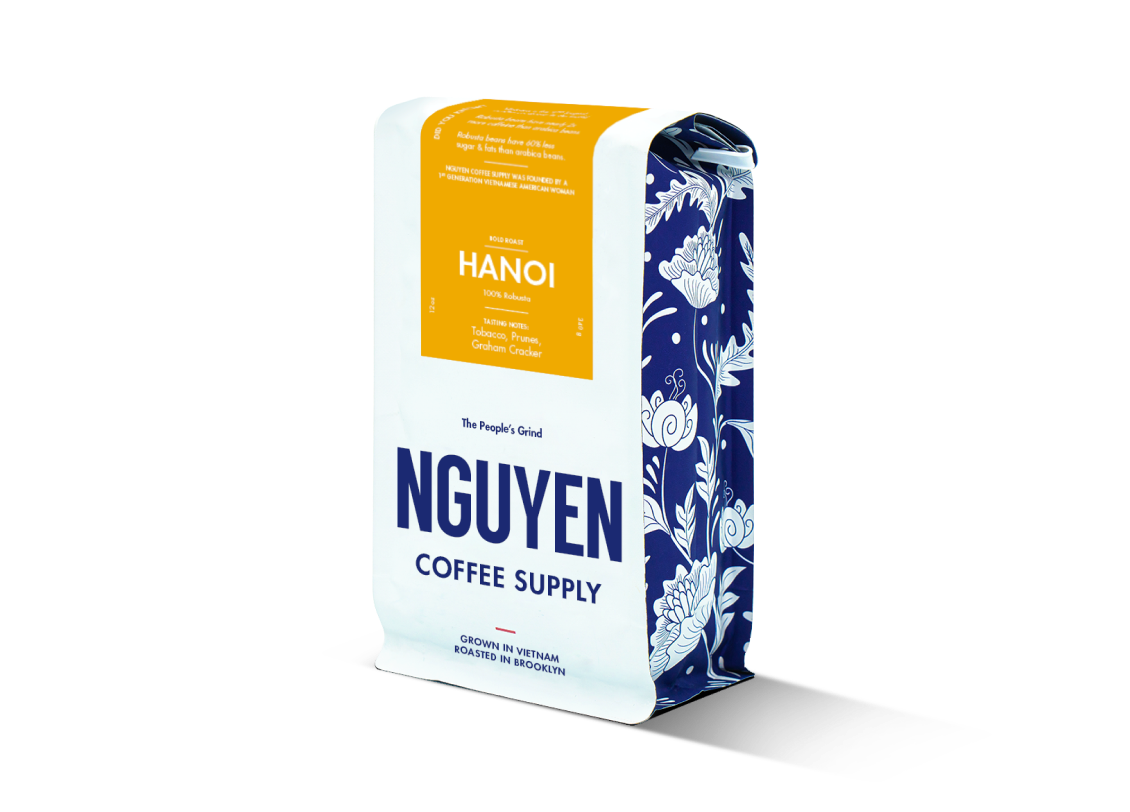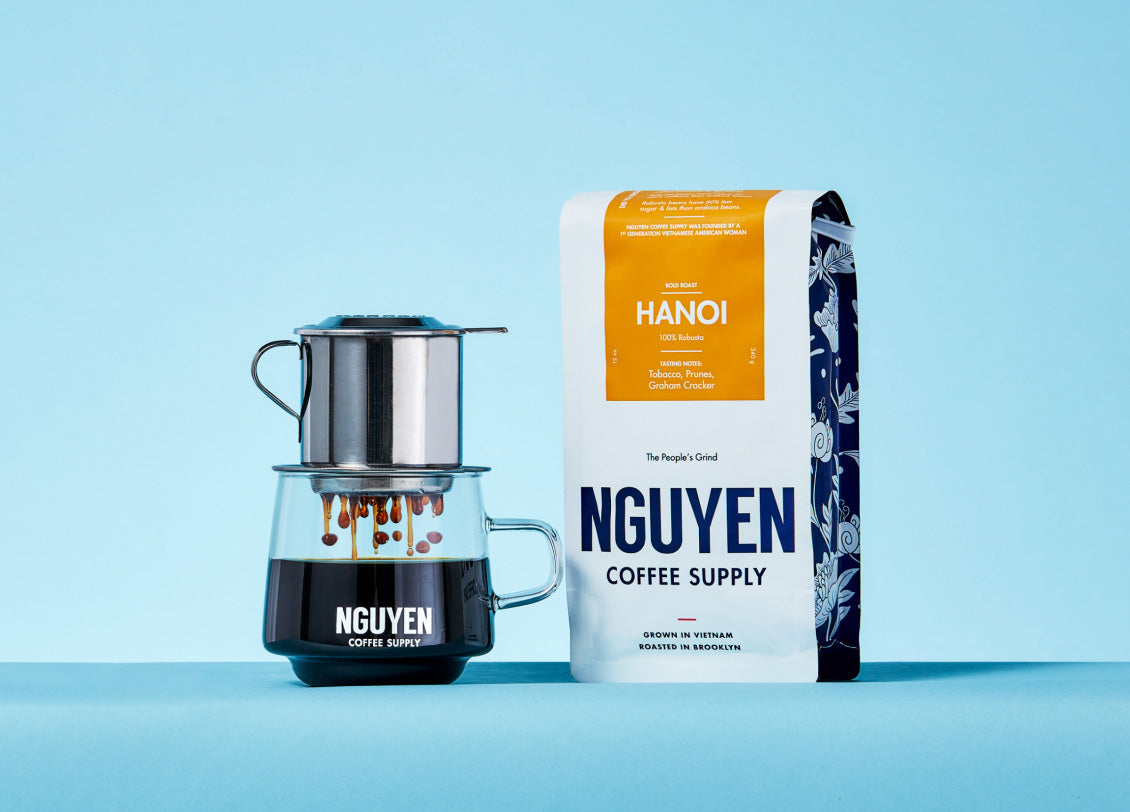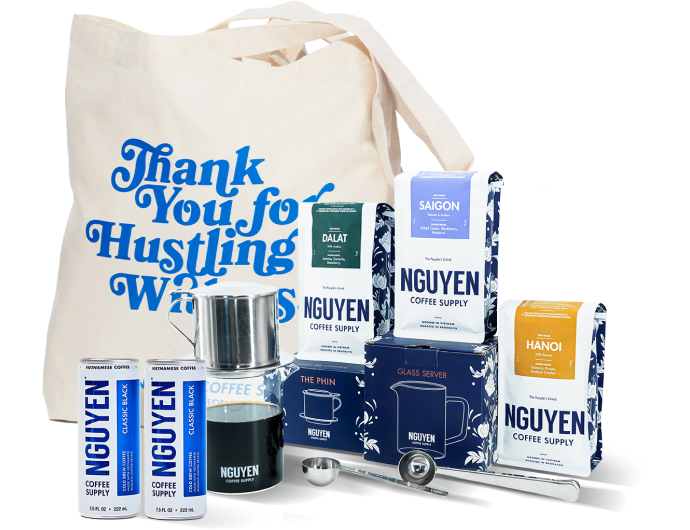

- FEATURED ON IMBIBE
Hanoi (100% Robusta)
- 🔥 Dark
- 🤤 Strong, Rich, Figs & Graham Cracker
- ☕️ Espresso, Phin Filter, Pour Over, Drip

Create for yourself or as a gift for your loved ones
Subscribe nowMe and mom just enjoyed the Nguyen phin drip experience. Wow. Proud of your work. We without hesitation enjoy the Vietnamese coffee and recommend your products. Thank-you to the Nguyen staff and tradition. From Canada eh!
We’re proud to say it: specialty Vietnamese robusta coffee is the future of specialty coffee. As climate change accelerates and environmental degradation exacerbates, coffee production globally will only become harder and more expensive. Studies suggest that rising temperatures will reduce the area suitable for growing coffee by up to 50% by 2050.
A majority of the coffee consumed in the United States comes from arabica beans produced in South America and Africa. However, arabica coffee requires specific growing conditions in terms of climate and altitude. As land becomes less available and climates warm, producing the same amounts of coffee to meet global demands will inevitably become unsustainable. That’s where Vietnamese robusta comes in.
Vietnamese robusta is adaptable and sustainable
Historically, robusta has been commercially cultivated due to these reasons which has also resulted in environmental degradation. These days, the specialty coffee movement ensures that not only are high quality coffee beans being produced, but also that the land on which they are grown is being protected and cultivated in a way that allows for future use.
Unlike its cousin arabica, robusta coffee grows anywhere between sea level and mountainous altitudes. Also, robusta coffee beans are naturally more pest- and disease-resistant as a result of their higher concentrations of caffeine which act as natural insecticides. Because of this, robusta coffee is not only easy to grow, but also manageable in terms of long-term production.
On farms such as the one we work with in Vietnam, farmers are growing specialty coffee beans while also cultivating crops such as black pepper and curry leaves which aid in soil nourishment and arability. Through investment in specialty coffee and sustainable agricultural practices, we can collectively ensure that coffee will be readily available and environmentally ethical for years to come.
Vietnamese robusta is naturally more abundant
Due to its relative ease of growth and hardy properties, robusta coffee trees generally produce higher yields of coffee beans on less land. Arabica coffee requires more water and land to yield an amount that would be higher if applied to robusta beans.
Additionally, robusta coffee trees can be harvested earlier than arabica trees which require longer cultivation periods. When combined with specialty coffee farming practices, this means that premium, delicious coffee beans can be produced with less effort, money, and time for years to come.
As the narrative around robusta coffee shifts and global needs in the industry are addressed, specialty Vietnamese coffee will become the logical solution to the inevitable shortages faced in countries such as Colombia, Brazil, Nicaragua, and others. While Vietnam is not exempt from deforestation and monopolization of arable land for commercial agriculture, the specialty coffee movement and adaptability of robusta coffee itself will prove to be insurance for the future of coffee globally! Vietnam is the second largest producer of coffee in the world and its beans may prove vital to ensuring future coffee consumption. As we continue to invest in specialty coffee and develop new varieties, these Southeast Asian beans may find their way not only into your cup, but to new lands and climates.
Learn about what makes Vietnamese coffee unique here.
Read about the history of coffee in Vietnam here.